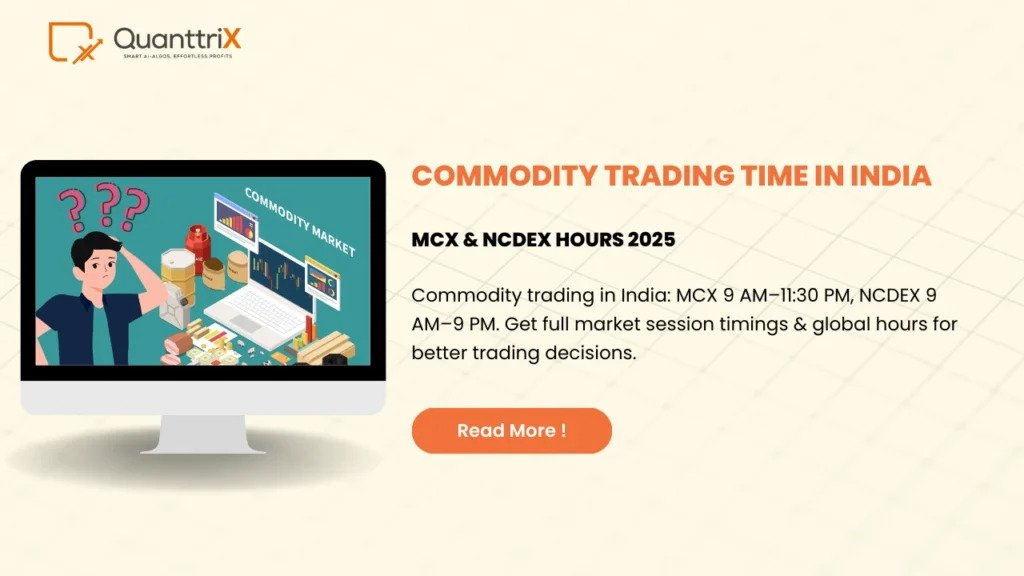What is Commodity Trading | Quanttrix
Introduction
Have you ever wondered how gold, oil, or even agricultural products are traded in financial markets? Welcome to the world of commodity trading. Think of it like a giant marketplace where instead of shopping for groceries, people are buying and selling goods like wheat, silver, crude oil, and natural gas—but in large quantities and often without ever physically touching them.
In this article, we’ll dive deep into what is commodity trading, why it matters, and especially the commodity trading time in India. By the end, you’ll understand how this fascinating market works and how you could be part of it if you choose.
Learn what is commodity trading, its benefits, and commodity trading time in India. Discover trading hours, basics, and strategies for beginners.
What is Commodity Trading?
Commodity trading is the buying and selling of raw materials or primary products like metals, energy, and agricultural goods. Instead of trading company shares like in the stock market, here you trade tangible goods—although most of the time, the trade happens through contracts and not actual physical delivery.
For example, if you invest in gold futures, you’re not necessarily getting gold bars delivered to your home. Instead, you are trading on the price movements of gold in the market.
Think of it like betting on whether the price of onions at your local store will go up or down—but on a global scale and with proper regulations.
Why Do People Trade Commodities?
People trade commodities mainly for two reasons:
- Hedging – Farmers, producers, or businesses lock in prices to protect themselves from price fluctuations. For example, a farmer may use commodity trading to secure a good price for wheat before harvesting.
- Speculation – Traders and investors try to profit from changes in commodity prices. If oil prices are expected to rise, traders may buy oil futures to sell later at a higher price.
In short, it’s about managing risks and making profits.
A Short History of Commodity Trading
Commodity trading isn’t new. It has existed for centuries. Ancient civilizations traded spices, grains, and metals. In India, agricultural markets known as mandis have been around for ages. Modern commodity exchanges, however, provide a structured and regulated way to trade.
Types of Commodities in Trading
Commodities are generally grouped into four broad categories:
- Metals – Gold, silver, copper, aluminum
- Energy – Crude oil, natural gas, coal
- Agriculture – Wheat, cotton, sugar, soybeans
- Livestock & Meat – Cattle, hogs, etc.
Each has its own market dynamics and price influencers.
Spot Market vs. Futures Market
- Spot Market: Commodities are bought and sold for immediate delivery.
- Futures Market: Commodities are traded for future delivery at a pre-agreed price.
Most commodity trading happens in the futures market, as it allows traders to speculate without needing the physical product.
How Commodity Trading Works
Commodity trading works through contracts. These contracts specify the quantity, quality, and delivery date of the commodity. Traders buy or sell these contracts depending on their market outlook.
For example:
- If you think silver prices will rise, you buy futures.
- If you think prices will fall, you sell futures.
Major Commodity Exchanges in India
In India, commodity trading is regulated by SEBI (Securities and Exchange Board of India). The two leading exchanges are:
- MCX (Multi Commodity Exchange of India) – Famous for metals and energy trading.
- NCDEX (National Commodity & Derivatives Exchange) – Popular for agricultural commodities.
Commodity Trading Time in India
Understanding commodity trading time in India is crucial for traders.
- Agricultural Commodities: 9:00 AM to 5:00 PM
- Non-Agricultural Commodities (Metals, Energy, etc.): 9:00 AM to 11:30 PM (extended up to 11:55 PM in daylight saving time)
This timing allows traders to align with both domestic and international market hours.
International Commodity Trading Time
Global commodity markets often operate almost 24 hours, especially in energy and metals. For instance, oil prices are influenced by trading in New York, London, and Singapore. That’s why Indian exchanges remain open late into the night—to match international markets.
Who Can Trade Commodities in India?
Anyone with:
- A trading account with a broker
- A Demat account for holding contracts
- Some knowledge about the market
Retail investors, farmers, hedgers, and even large corporations participate in commodity markets.
Benefits of Commodity Trading
- Diversification: Commodities often move differently from stocks.
- Inflation Hedge: Commodity prices rise when inflation rises.
- Profit Potential: Traders can benefit from both rising and falling prices.
Risks in Commodity Trading
- High Volatility: Prices can swing wildly due to global events.
- Leverage Risk: Futures contracts involve margins, leading to high risk.
- Market Knowledge Required: Lack of research may lead to losses.
How to Start Commodity Trading in India
Steps to begin:
- Choose a reliable broker.
- Open a commodity trading account.
- Complete KYC formalities.
- Fund your account.
- Start with small trades in liquid commodities like gold or silver.
Common Strategies for Commodity Traders
- Trend Following: Trading in the direction of the market trend.
- Range Trading: Buying at support levels and selling at resistance.
- Arbitrage: Profiting from price differences across markets.
- Hedging: Using contracts to protect against price fluctuations.
Tips for Beginners
- Start small and avoid over-leveraging.
- Learn about global events affecting commodities.
- Focus on 1-2 commodities at first.
- Always set stop-loss to limit losses.
Role of Technology in Commodity Trading
Modern trading platforms provide live data, charts, and analysis tools. Mobile apps make it easier for beginners to start trading commodities from anywhere.
Future of Commodity Trading in India
With increasing globalization, government support, and digital platforms, commodity trading in India is set to grow rapidly. As awareness increases, more retail investors are expected to enter the market.
Conclusion
Commodity trading is more than just numbers on a screen—it’s about understanding the pulse of the global economy. From gold to crude oil, commodities impact our daily lives in ways we don’t always notice.
If you’ve been asking, “What is commodity trading?”, now you know it’s both a way to manage risks and a chance to earn profits. And by being aware of the commodity trading time in India, you can plan your trades smartly.
FAQs
1. What is commodity trading in simple terms?
It is buying and selling raw materials like metals, oil, and agricultural products to make profits or manage risks.
2. What is the commodity trading time in India?
Agricultural commodities trade from 9 AM to 5 PM, while non-agricultural commodities trade from 9 AM to 11:30 PM (11:55 PM in DST).
3. Is commodity trading risky?
Yes, it is riskier than stock trading due to price volatility, but with proper strategies, risks can be managed.
4. Can beginners start commodity trading in India?
Yes, anyone with a trading account and some market knowledge can start. Beginners should start small and learn gradually.
5. Which is the best commodity to trade in India?
Gold, silver, and crude oil are considered the most liquid and beginner-friendly commodities.
Related Reads
- Are There Affordable Options for Varicose Vein Treatment?
- 5 Best Sites to Buy YouTube Subscribers to Boost Video Engagement
- AI Dating App Development Trends Shaping Middle East’s Digital Romance
- What Are the Benefits of Regular Dental Cleanings?
- The Grand Hotel Banquet and Lawn – A Perfect Wedding Venue in Lucknow



